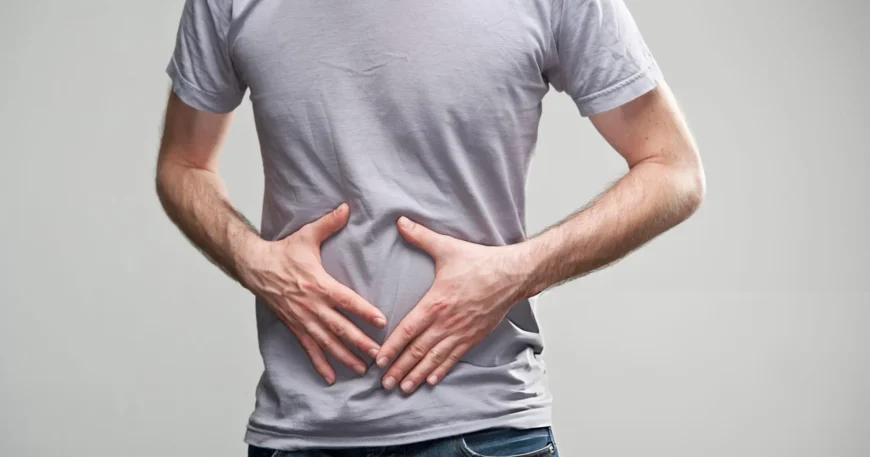
Mens Gut Health: Common Issues, Warning Signs & When to See a GP
Mens Gut Health: Common Issues, Warning Signs & When to See a GP
Your gut’s been acting up lately. Maybe it’s that burning feeling after a big meal, or you’re spending way too much time in the bathroom. You tell yourself it’s normal – blokes deal with this stuff, right? Wrong. Your digestive system is trying to tell you something important.
Understanding mens gut health is different from women’s digestive issues. Men face unique challenges that often get brushed off as “normal” when they’re actually warning signs.
Gut problems are common in men, but ignoring them can make things worse. At Huntlee Healthcare, our GPs focus on men’s health and can help you get back on track. Book your appointment today. Book a GP Appointment at Huntlee Healthcare.
Why Mens Gut Health Gets Ignored
Let’s be honest – most guys don’t rush to the doctor for stomach issues. We tend to think heartburn is just part of getting older, or that bloating comes with the territory of enjoying a few beers after work. But here’s the thing: your gut health affects way more than you think.
Your digestive system doesn’t just break down food. It houses about 70% of your immune system and produces chemicals that affect your mood, energy levels, and overall health. When your gut’s out of whack, everything else can follow.
The problem is, men are three times less likely than women to see a GP for digestive issues. We’re also more likely to self-medicate with antacids or just “tough it out” until symptoms become unbearable. This approach often backfires, especially when it comes to mens gut health over 40.
Common Gut Problems Men Face
Heartburn and Reflux
That burning sensation in your chest after eating isn’t just annoying – it’s your stomach acid escaping where it shouldn’t be. Men are twice as likely as women to develop serious reflux disease, especially if you’re over 40.
Common triggers include:
- Spicy foods and citrus
- Coffee (sorry, but it’s true)
- Alcohol, especially beer and wine
- Large meals late at night
- Being overweight around the middle
Bloating and Gas
Feeling like you’ve swallowed a balloon? Bloating happens when bacteria in your gut ferment undigested food, producing gas. While everyone gets gassy sometimes, constant bloating isn’t normal.
This often comes from:
- Eating too fast (guilty?)
- Foods high in added sugar
- Beer and carbonated drinks
- Processed foods with artificial additives
- Not getting enough physical activity
Constipation
If you’re not having regular bowel movements, your large intestine isn’t doing its job properly. Constipation affects millions of Australian men, but it’s often dismissed as “just one of those things.”
The main culprits are:
- Not eating enough fruits and vegetables
- Low fibre intake
- Not drinking enough water
- Lack of exercise
- Stress from work or life pressures
Diarrhea and IBS
Irritable Bowel Syndrome (IBS) affects about 15% of Australian adults, with men often experiencing different symptoms than women. While women with IBS tend to get constipated, men are more likely to have diarrhea-predominant IBS.
Signs include:
- Urgent bathroom trips
- Loose stools several times a day
- Stomach cramping before bowel movements
- Feeling like you can’t fully empty your bowels
Bloating, reflux, or constant stomach pain? These are not just ‘everyday issues.’ Our men’s health GPs at Huntlee Healthcare are here to check your gut health and find real solutions. Schedule your consultation now. Check My Gut Health at Huntlee Healthcare.
Warning Signs You Can’t Ignore
Some symptoms need immediate attention. Don’t wait if you’re experiencing:
Blood in your stool: This could indicate anything from hemorrhoids to more serious conditions. It’s always worth checking out.
Sudden weight loss: Losing weight without trying, especially combined with gut symptoms, needs investigation.
Severe abdominal pain: If pain is intense enough to double you over or keeps you awake at night, see a GP immediately.
Changes in bowel habits lasting more than 2 weeks: New patterns of constipation, diarrhea, or changes in stool consistency should be checked.
Persistent nausea or vomiting: Especially if it’s affecting your ability to eat or drink normally.
Family history red flags: If your dad, uncle, or brother had bowel cancer, inflammatory bowel disease, or other serious gut conditions, don’t take chances with symptoms.
How Your Lifestyle Affects Your Gut
The Hunter Region Reality Check
Living in regional NSW comes with its own challenges for gut health. Long commutes, shift work, and limited food options can all impact your digestive system. Add in the stress of work in mining, farming, or other physical jobs, and your gut takes a beating.
Many blokes in our area grab food on the go – meat pies, fast food, or whatever’s available at the servo. While convenient, these choices don’t give your gut microbiome the nutrients it needs to stay healthy. Research shows that mens gut health is particularly affected by irregular eating patterns and high-stress lifestyles common in regional areas.
Ignoring early warning signs is common, too. Most mens gut health problems start with simple symptoms that gradually get worse if left untreated.
Stress and Your Digestive System
Your gut and brain are connected through what scientists call the “gut-brain axis.” When you’re stressed at work or home, your digestive system feels it too. Chronic stress can:
- Slow down digestion
- Increase stomach acid production
- Disrupt the balance of bacteria in your gut
- Trigger IBS symptoms
- Make you more sensitive to pain
Alcohol’s Real Impact
A few drinks after work might help you unwind, but alcohol can seriously mess with your gut health. It kills beneficial bacteria, irritates your stomach lining, and can trigger reflux. If you’re having gut problems, cutting back on alcohol often helps more than you’d expect.
Simple Ways to Improve Mens Gut Health
Focus on Real Food
Your gut microbiome thrives on variety, especially fibre from plants. You don’t need to become a health nut overnight, but small changes make a difference:
Add more fruits and vegetables to what you’re already eating. Throw some spinach in your scrambled eggs, add tomato and cucumber to sandwiches, or snack on apples instead of chips.
Choose fermented foods when possible. Greek yogurt, sauerkraut, and even good-quality sourdough bread contain beneficial bacteria that support your digestive system.
Cut back on processed foods gradually. Instead of processed lunch meat, try leftover roast chicken. Swap white bread for wholegrain options.
Stay Active
Physical activity helps your digestive system work properly. It doesn’t have to be complicated – a 20-minute walk after dinner can prevent constipation and reduce bloating. If you’re already active at work, that counts too.
Manage Stress
Easier said than done, right? But finding ways to decompress really does help your gut. Whether it’s fishing, watching footy, or just having a quiet beer in the garden, regular downtime helps your digestive system reset.
When to See a GP About Gut Issues
Here’s the straight truth: if gut problems are affecting your daily life, it’s time to see someone. You don’t need to suffer through every meal or plan your day around bathroom breaks.
See a GP if you have:
- Symptoms lasting more than a few weeks
- Pain that’s getting worse instead of better
- Trouble eating or sleeping because of gut issues
- Any of the warning signs mentioned earlier
- Gut problems that run in your family
Most gut health problems in men can be managed – but only if you act early. At Huntlee Healthcare, we take men’s health seriously and offer professional care in a comfortable setting. Book your gut health check today. Book Men’s Gut Health Consult
What to Expect at Your Appointment
Many guys avoid GP visits because they don’t know what to expect. Here’s what typically happens:
Your GP will ask about your symptoms, family history, and lifestyle. They might examine your abdomen and could order tests like blood work or stool samples if needed. Most gut issues can be diagnosed and treated without invasive procedures.
The conversation might cover:
- Your current diet and eating habits
- Stress levels and how you manage them
- Medications you’re taking
- Exercise and sleep patterns
- Alcohol and tobacco use
Treatment Options That Actually Work
Dietary Changes
Most gut problems improve with the right food choices. Your GP might suggest:
- Increasing fibre gradually to prevent constipation
- Identifying trigger foods for IBS or reflux
- Adding probiotic supplements if needed
- Reducing foods and drinks that worsen symptoms
Medications
Sometimes medication helps while you make lifestyle changes. Options include:
- Acid reducers for reflux
- Medications to regulate bowel movements
- Treatments for specific conditions like IBS
- Short-term solutions while addressing root causes
Lifestyle Modifications
Your GP can help you create a realistic plan that fits your life. This might include stress management techniques, exercise recommendations, or sleep improvements.
The Bottom Line on Mens Gut Health
Looking after your gut isn’t just about avoiding discomfort or awkward moments. Your digestion plays a big role in keeping your immune system strong, helping your body use nutrients from food, and even supporting your mood.
When your gut is healthy, everything else in your body works better, too. Ignoring gut problems won’t make them disappear, they usually get worse. The good news is that most gut issues can be treated, especially if you get help early.
At Huntlee Healthcare, we know men often put off talking about gut health, but you don’t have to manage it on your own. Whether you’re dealing with reflux, bloating, constipation, or ongoing stomach pain, our GPs are here to help. Small steps today can stop bigger problems tomorrow. Book Your GP Appointment at Huntlee Healthcare
FAQs
What does gut health mean for men?
Gut health refers to how well your digestive system works, including your stomach, intestines, and gut bacteria. It affects energy, immunity, and overall men’s health.
What are the most common gut issues men face?
Men often deal with reflux, bloating, constipation, diarrhoea, and IBS. Lifestyle factors like stress, alcohol, and poor diet are common triggers.
When should men see a GP about gut problems?
See a GP if symptoms last more than two weeks, affect daily life, or if you notice red flags such as blood in stool, sudden weight loss, or severe pain.
Is bloating normal for men?
Occasional bloating is common, but frequent or painful bloating may point to food triggers, reflux, or IBS. Persistent symptoms should be checked.
How can men improve gut health naturally?
Eat more fibre-rich foods, drink water, reduce alcohol, stay active, and manage stress. Small changes make a big difference over time.
Does stress affect men’s gut health?
Yes. Stress can trigger reflux, bloating, and IBS by disrupting digestion. Relaxation and regular downtime often ease symptoms.
What support does Huntlee Healthcare offer for men’s gut health?
Our GPs provide men’s health checks, diagnose gut problems early, and create treatment plans tailored to your lifestyle and needs.




